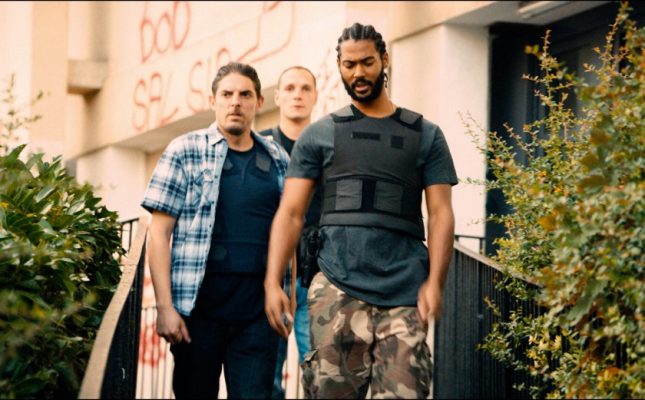There is an unmistakable, signposted irony in Ladj Ly’s Les Misérables, opening as it does with scenes of national, multi-ethnic unity. France has just won the World Cup and Paris bounces from the Eiffel Tower to the Champs-Élysées. The tricolor is waved from windows, worn as capes, and daubed on grinning faces. Yet we know this show of fraternité is akin to sticking a plaster on a gangrenous limb. From this falsely upbeat opening, Ly’s debut feature is quick to hurl its protagonists into a monstrous hangover as racial and social tensions are vomited up in a potent echo of the riots of 2005 that saw the city burn.
Stéphane (Damien Bonnard) is a new recruit to Montfermeil’s anti-crime task force. His first day on patrol with volatile racist Chris (Alexis Manenti) and local boy Gwada (Djebril Zonga) is a nightmare as he’s drawn into an internecine dispute sparked by a young resident (Issa Perica) stealing a lion cub from a Romany circus. All the factions – the police, the young black youths, their unofficial boss ‘The Mayor’ (Steve Tientcheu), the gipsies, the Muslim Brotherhood, and a gang of Middle-Eastern drug dealers – are all pulled into the escalating situation. A sudden, shocking moment of police brutality threatens to tip the delicate balance past the point of no return.
The touchstones for Les Misérables besides Victor Hugo‘s classic, are La Haine, Do the Right Thing, and Training Day. All of these are squeezed into this bursting, tumultuous 24 hours in the simmering melting pot of the Montfermeil banlieue. Drawing clearly from these incendiary classics may seem like a way of shrieking its own importance, but its urgent depiction of various factions acting to maintain a jittery, ignitible equilibrium serves to show modern city life as a powder keg to unnerving effect.
The film is possessed of such a propulsive, furious spirit that individual characters get lost in the melee. We learn next to nothing of the personal lives of les flics, with Stéphane framed as the audience surrogate, an appalled Dante being led through an Inferno (in a further echo of Do the Right Thing, the day is scaldingly hot). Even more clearly delineated figures such as Issa and ‘The Mayor’ are characterised purely to the extent that the plot necessitates. The theft of the lion cub is also a weirdly absurd straw to throw on the camel’s back. One could see the crazed domino effect it triggers being presented as a pure caper in the hands of a Guy Ritchie-style director.
Nevertheless, Les Misérables fizzes with the authenticity of a director who knows his environment. The 2005 riots, referred to explicitly in the film, kicked off in the area in which Ly lived, and therefore there is always the curdling knowledge that for all the bravado of the likes of Chris, the so-called lawmen are simply little boys trying to plug a straining dyke with their fingers. As such, the film is a scream of rage rather than a cautionary polemic. It isn’t offering answers; the question was asked long ago and those with any real power simply shrugged. There’s something exhilarating about the nihilistic charge this generates, one that comes to a stunning climax in a searing final shot of ruthless ambiguity that will be hard to shake.
As part of Glasgow Film Festival 2020
